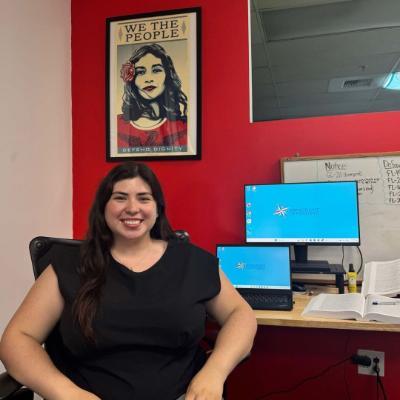
For rising 2L Stephanie Castillo, a longtime interest in immigration law and a commitment to public interest work led to a meaningful summer position as a legal clerk with the Children’s Representation Program at Immigrant Defenders Law Center. Through hands-on experience, she’s honing her legal skills and deepening her understanding of the complex and ever-evolving field of immigration law, particularly as it applies to children navigating the immigration system.
How did you land your summer job?
This summer, I am working as a legal clerk with the Children’s Representation Program (CRP) at Immigrant Defenders Law Center (ImmDef), an organization I have admired for a long time. I came to law school with a strong commitment to public interest work, especially in immigration law, and have tailored my studies to reflect this. I interviewed with ImmDef during the SoCal Public Interest Career Day and was offered the position the same day. In preparation for the career day, I was able to practice interview questions with my career development counselor, which helped build my confidence and gave me the tools necessary to feel prepared.
What is the most interesting part of your job?
Immigration law is constantly evolving, and the challenges we face in CRP make the work engaging. Each case feels like a puzzle, requiring careful thought to determine what forms of relief a client may or may not qualify for. The uniqueness of every story makes the work both intellectually stimulating and meaningful.
What has been your most challenging assignment thus far?
My most challenging assignment involved researching forms of nontraditional relief for a client who currently needs medical care in the U.S. but had no familial ties to the U.S. As this client did not qualify for traditional options, this required exploring alternative forms of asylum or humanitarian relief. To support the client’s unique circumstances, I had to expand my research beyond Westlaw and Lexis, turning to Kurzban’s Immigration Law Sourcebook and unpublished cases for guidance.
What new legal skill have you acquired during your summer job?
I have received thorough training in child interviewing, learning about the sensitivity needed when working with children who have experienced trauma or detention. Many of the children at ImmDef have faced difficult circumstances, so learning how to build trust and helping them feel safe enough to share their immigration stories has been essential in identifying the forms of relief for which they may be eligible.
What bit of legal knowledge have you been able to display?
Working with children, I’ve been able to draw on what I learned in my Introduction to Immigration Law course, especially when identifying what forms of relief a client may be eligible for. This has been particularly helpful in Special Immigrant Juvenile Status (SIJS) cases, where understanding the legal requirements and the client's personal circumstances are essential. These cases often involve children who have faced neglect, abandonment, or abuse, so knowing how to approach each case with care and identifying whether they meet these standards has been critical in supporting their path toward relief. I have also had the opportunity to build on the research skills I developed during the first semester of my 1L year. Having these skills has helped me feel more confident when tasked with finding case law and precedent.
How has Loyola helped you map your career path?
Loyola has helped shape my career path by allowing me to explore my interests early on. As a 1L, I was able to take the elective Introduction to Immigration Law with Professor Kim, which confirmed my passion for the field. The course gave us the chance to engage with the history of immigration law and its modern-day application, while also helping us better understand current events. Although 1Ls typically do not work with clinics, I had the opportunity to assist with consultation intakes through the Loyola Immigrant Justice Clinic. There, I worked directly with LIJC attorneys and potential clients, gaining valuable hands-on experience.